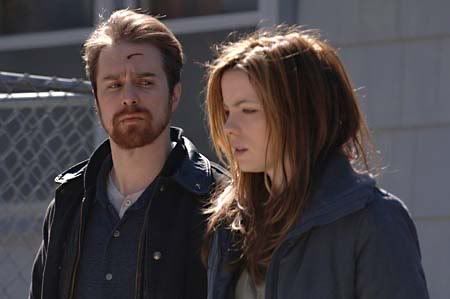
For yet another indie relationship drama without a straightforward plot and more than one central character, David Gordon Green makes something of a quiet masterpiece out of "Snow Angels," based on the 1994 book by Stewart O'Nan. Although the film begins with us overhearing two gun shots and then backing up to show us their origin, "Snow Angels" takes a long time to develop its conflict, which puts pressure on Green to keep our attention. He does so fairly well, using convincing realism to set his characters and audience up for the tragedy that follows.
Green, whose previous credits are also of the independent tragedy vein, has a way of self- referencing the story through visuals that interconnect the film's many sub-plots. Taking place in a small town where it's incredibly cold (it's snowing during football season), a high school student named Arthur (Michael Angarano) deals with his parents' separation and the new girl, Lila, (Olivia Thirlby) who he doesn't realize is completely into him. In the Chinese restaurant where he works, his former babysitter Annie (Kate Beckinsale) is living the tough life of a single mother whose ex (Sam Rockwell) is a born-again Christian battling a drinking problem that wants to get his family back together.
The stories connect structurally in that they both deal with divided families, but one really admirable quality about it is that Green will take an image or something that a character talks about in one sub-plot and manifest it in another. In one scene, Arthur talks about using his mother's hand mirror when he was younger to peep under the door when Annie was babysitting him and taking a shower. Later, Rockwell's character Glenn is seen holding a hand mirror.
This technique really helps unify the story in a way that the plot never really does. "Snow Angels" is collectively about the familial ideal, of wanting things in love and family to work out and trying to make amends for the mistakes that harm it while battling one's own personal feelings and desires. The drama comes from the Annie-Glenn story line and that's supposed to influence how we think about what's going on with Arthur and his family and his girlfriend, which is the more realistic and conflict-free part of the story.
There's also a good deal of pressure on the actors when the conflict is really only coming from one source in a multi-plot story. Angarano and Thirlby play wonderful innocent kids falling for each other, but the true talent in the film is Rockwell. His character is the most troubled and the most complex, the one who really drives the conflict by not leaving Annie and their young daughter alone and trying to fight Annie's new boyfriend. He convinces you that he's worthy of a second chance, but then fails to meet your expectations. It's a role that requires him to be completely committed to a flawed point of view and Rockwell nails it.
Films without focused and attention-grabbing plots don't often get bonus points, but Green wins about as much of them there are for drawing out some important questions and meaning from the relationship drama of the film. The realism with which he portrays these characters, their softness and fragility, makes them intriguing enough for us to watch carefully so we can understand what it is that really makes their story a tragedy.
3.5/5 Stars
Directed by: David Gordon Green
Written by: David Gordon Green, Stewart O'Nan (novel)
Starring: Sam Rockwell, Kate Beckinsale




No comments:
Post a Comment